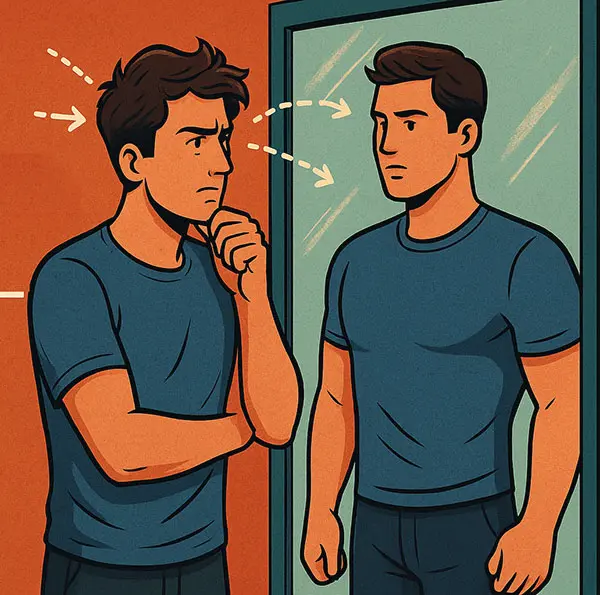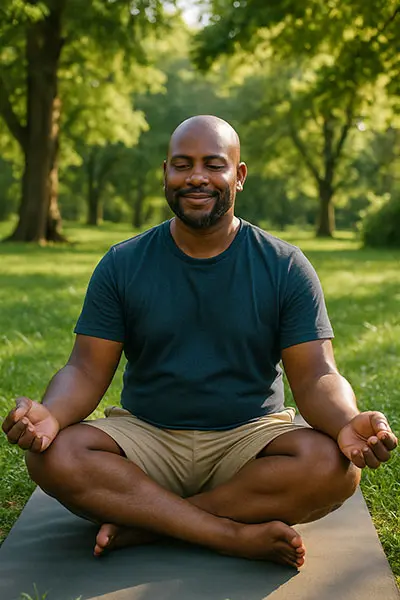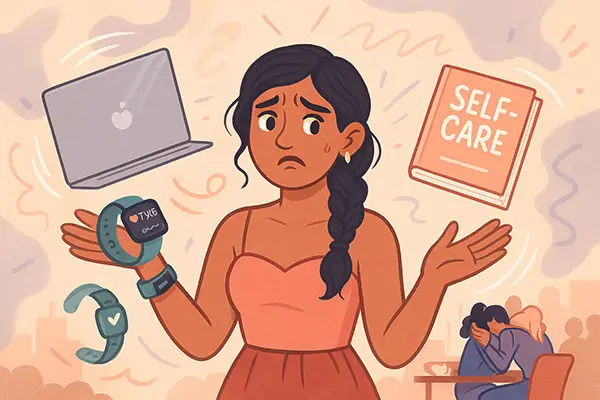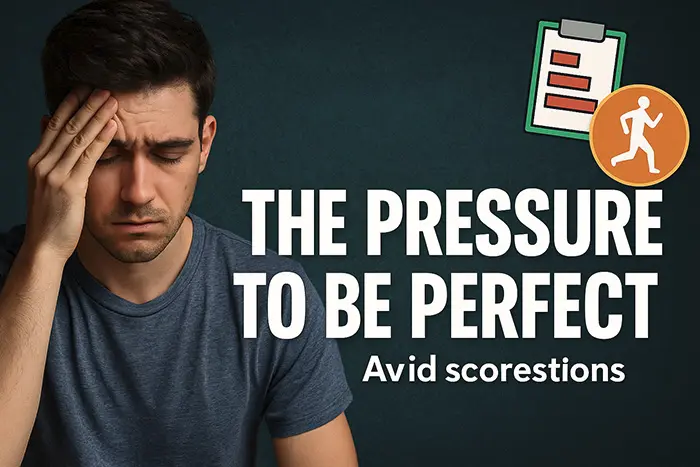I always thought self-growth was supposed to feel good. But eventually, I noticed I wasn’t improving I was performing. Every book, habit tracker, and morning routine became another box to check. 🗓 And beneath it all lived constant anxiety: “Am I doing enough?” and how to reduce constant improvement stress?

Ever feel like you’re running on a treadmill of self-improvement, but never getting anywhere? From productivity apps to self-help books, the pressure to optimize every part of our lives can leave us drained and guilty for just being. This article dives deep into the psychological fatigue of constant self-optimization, exploring productivity shame, perfectionism, and toxic self-help culture. Learn how to break free and embrace rest as your radical act of self-love. Ready to stop the hustle? Let’s find peace together.
Table of Contents
- Introduction
- What Is the Pressure of Constant Self-Optimization?
- Why We Feel This Pressure
- How It Affects Your Mind and Body
- Signs You’re Caught in the Optimization Trap
- Practical Ways to Break Free
- Name the Pressure’s Source
- Embrace Self-Compassion
- Make Room for Unstructured Time
- Soothe Your Nervous System
- Limit Comparison Triggers
- Reconnect with Joyful Growth
- Self-Optimization and the LGBTQ+ Experience
- Q&A: Your Questions Answered
- Conclusion: You’re Enough, Just as You Are
- The Endless Race of Self-Optimization
- The Anxiety of Falling Behind
- Productivity Shame: The Guilt of Doing “Nothing”
- Perfectionism’s Exhausting Grip
- Toxic Self-Help: When “Fixing” Yourself Breaks You
- Final Thoughts: Rest Is Revolutionary
- FAQs: Your Questions Answered
Introduction
Ever feel like you’re on a treadmill that never stops, chasing the “best version” of yourself? Oh man, I totally get it. 😅 A couple of years ago, I was obsessed with optimizing every part of my life waking up at 5 a.m., meditating, journaling, hitting the gym, reading self-help books, you name it. At first, it felt empowering, like I was finally taking control. But soon, it turned into this quiet, nagging anxiety. Every missed workout or skipped journal entry made me feel like I was failing. I wasn’t growing I was performing, checking boxes to prove I was “enough.”

That’s the hidden pressure of constant self-optimization, a sneaky force that makes you feel like you need to be better, faster, smarter, all the time.
It’s fueled by social media, self-help culture, and our own inner critics, and it can leave you exhausted, never feeling good enough.
For folks in the LGBTQ+ community, this pressure can hit even harder due to societal expectations or identity struggles.
In this guide, we’ll unpack why this pressure creeps in, how it messes with your mind and body, and practical ways to step off that treadmill and find a healthier way to grow. Whether you’re overwhelmed by productivity hacks or just wanna feel okay being you, I’ve got some real talk and tips to share. Ready to ditch the pressure and embrace your perfectly imperfect self? Let’s dive in! 🚀
What Is the Pressure of Constant Self-Optimization?
Self-optimization is the pursuit of becoming your best self think improving your health, productivity, relationships, or skills. It’s about setting goals, trying new habits, and pushing your limits. Sounds great, right? But when it becomes a relentless drive to be better every single day, it can turn into a trap.
This pressure to optimize comes from feeling like you’re never doing enough. Maybe you’re tracking your steps, your sleep, your water intake, and still feel like you’re falling short. Or you’re reading every self-help book out there, but instead of feeling empowered, you’re stressed about not implementing every tip perfectly.

According to Psychology Today, this pressure often stems from perfectionism, where we tie our worth to our achievements. It’s like we’re trying to earn our place in the world by being the most optimized version of ourselves. But here’s the kicker: no one can sustain that forever. True growth happens when we balance effort with rest, ambition with contentment.
Why We Feel This Pressure
So, why do we feel this constant need to optimize? Let’s break it down:
- Social Media’s Highlight Reels: Platforms like Instagram and TikTok are full of influencers showing off their perfect morning routines, fitness goals, or career wins. It’s easy to compare your messy life to their curated perfection and feel like you’re not measuring up. A 2021 study from Pew Research Center found that social media comparison can lower self-esteem and increase anxiety.
- Self-Help Culture: The self-help industry, while offering great tools, sometimes pushes the idea that you need to be constantly improving to be happy. Books, podcasts, and courses often emphasize productivity hacks or mindset shifts, leaving little room for rest or imperfection.
- Fear of Falling Behind: In a fast-paced world, there’s a fear that if you’re not optimizing, you’re losing ground. This scarcity mindset makes you feel like time’s running out to achieve your goals.
- Perfectionism in Disguise: What looks like a “growth mindset” can actually be perfectionism, where you feel like you’re never good enough unless you’re always improving.
- Subtle Shame for Resting: Society often glorifies hustle, making rest feel like laziness. I used to feel guilty for taking a nap instead of working on my side hustle.
These pressures can make you feel like you’re in a race with no finish line, always chasing the next milestone.
Social media glorifies hyper-productivity
Self-help culture markets constant improvement
Fear of falling behind others drives comparison
Perfectionism disguised as “growth mindset”
Subtle shame for simply resting

How It Affects Your Mind and Body
The pressure to optimize doesn’t just mess with your head it takes a toll on your body too. When you’re constantly striving, your nervous system can get stuck in a state of fight-or-flight, pumping out stress hormones like cortisol. According to Harvard Health, chronic stress can lead to a host of issues:
- Physical Symptoms: Fatigue, headaches, muscle tension, digestive problems, or trouble sleeping.
- Mental Symptoms: Anxiety, irritability, difficulty focusing, or feeling overwhelmed.
- Emotional Symptoms: Guilt when resting, dissatisfaction with progress, or a sense of never being enough.
I remember a time when I was so focused on optimizing my life tracking workouts, meals, and productivity that I couldn’t relax without feeling guilty. My shoulders were always tense, and I’d wake up exhausted, even after a full night’s sleep. It was like my body was screaming, “Give me a break!”
This constant state of stress can lead to burnout, where you’re so drained you lose motivation for the things you once loved. Frontiers in Psychology found that perfectionism is linked to increased stress and burnout, especially when we tie our worth to our achievements.
How This Pressure Affects The Nervous System
- Persistent fight-or-flight activation
- Inability to fully relax without feeling guilty
- Hyper-monitoring every habit and routine
- Exhaustion despite constant “self-care”
Signs You’re Caught in the Optimization Trap
Not sure if you’re stuck? Here are some signs you might be caught in optimization anxiety:
- Feeling Behind: You always feel like you’re not doing enough, even when you’re achieving goals.
- Never Satisfied: No matter how much you accomplish, it’s never enough. There’s always another goal to chase.
- Comparison Overload: You compare your routines or progress to others, especially on social media.
- Harsh Self-Judgment: You’re overly critical of small setbacks, like missing a workout or not finishing a book.
- Loss of Joy: Activities you used to love like reading or cooking feel like chores because you’re focused on optimizing them.
- Guilt During Rest: You feel anxious or lazy when you take a break, thinking you should be productive instead.
If these sound familiar, you’re not alone. I used to beat myself up for not sticking to my morning routine perfectly, until I realized it was stealing my joy.

Feeling behind if you’re not actively improving
Rarely feeling satisfied with progress
Comparing your routines to influencers’ highlight reels
Judging small setbacks harshly
Loss of joy in activities once enjoyable
Practical Ways to Break Free
Ready to step off the optimization treadmill? Here are six practical strategies to find balance and peace:
Name the Pressure’s Source
Ask yourself, “Who am I trying to impress?” Is it social media, your inner critic, or societal expectations? Naming the source can help you see it’s not about your worth it’s about external pressures. I realized my drive to optimize came from wanting to “keep up” with my peers, not from my own desires. For more on identifying pressures, check out our Emotional Boundaries guide.

Embrace Self-Compassion
Replace perfectionism with self-compassion. Treat yourself like you’d treat a friend who’s struggling kindly and gently. Try saying, “I’m doing my best, and that’s enough.” I started doing a self-compassion break placing a hand on my heart and saying, *“It’s okay to rest” *and it was a game-changer. Learn more in our Building Self-Compassion guide.
Make Room for Unstructured Time
Schedule time with no productivity goals. Go for a walk without your phone, watch a silly movie, or just daydream. I started blocking out Sunday afternoons for “nothing time,” and it felt like giving my brain a vacation. This helps you reconnect with the present moment without the need to optimize.

Soothe Your Nervous System
When guilt or anxiety creeps in during rest, use grounding techniques. Try the 4-7-8 breathing method: inhale for 4 seconds, hold for 7, exhale for 8. Or do a body scan to release tension. I do this when I’m stressing about not “doing enough,” and it calms me right down. Our Grounding Techniques for Anxiety guide has more tips.
Limit Comparison Triggers
Curate your social media feed to include accounts that inspire balance and authenticity, not perfection. Unfollow or mute profiles that make you feel inadequate. I unfollowed a fitness influencer whose posts made me feel like a failure, and it was so freeing. For more on managing social media, see our Self-Care and Digital Minimalism guide.

Reconnect with Joyful Growth
Focus on activities that bring you meaning and joy, not just productivity. Ask yourself, “What makes me feel alive?” Maybe it’s painting, cooking, or helping a friend. I rediscovered my love for writing poetry when I stopped trying to “optimize” my creativity. Let your growth be messy and imperfect it’s more authentic that way.
“Perfectionism is the belief that something is broken you,”
– Edith Eger.
Self-Optimization and the LGBTQ+ Experience
For LGBTQ+ folks, the pressure to optimize can feel heavier due to societal expectations or discrimination. You might feel the need to prove your worth through perfect achievements like a flawless career or body to counter stigma or rejection. For example, a trans friend of mine felt they had to excel at work to be taken seriously, which left them exhausted. Finding affirming spaces, like queer support groups or therapists, can help ease this pressure. Resources like The Trevor Project offer tailored mental health support for navigating these challenges.


The Endless Race of Self-Optimization
It’s kinda wild, right? You grab another self-help book, fine-tune your morning routine, download the latest productivity app… and yet, you still feel like you’re falling short. 😵💫 It’s like chasing a finish line that keeps moving. No matter how many habits you stack or goals you crush, your brain’s like, “Yo, you should be doing more.” And don’t even think about resting without a good excuse. “Recharge to perform better”? Even your downtime’s gotta be productive. 🙄
This constant push to optimize every bit of our lives steps, sleep, mood, even how much water we drink can lead to what’s called self-optimization fatigue. It’s not just you; it’s a cultural thing. We’re drowning in messages to “level up” or “become your best self,” but what happens when that “best self” feels impossible to reach? I remember sitting in my college dorm, scrolling through Instagram, seeing everyone’s perfect lives, and thinking, “Why can’t I keep up?” That pressure? It’s real, and it’s exhausting. Research from Psychology Today suggests that chronic stress from trying to be “better” can lead to burnout, especially when we tie our worth to productivity.

The Anxiety of Falling Behind
Okay, true story: I once wrote a to-do list in the bath. Like, balancing a waterproof notebook on my knees, trying to “relax.” Guess what was on the list? “Be more present.” I laughed so hard I almost cried. Then I did cry. Then laughed again. 😅 We’ve turned self-worth into a project, tracking every step, sip of water, and minute of sleep like our existence needs a performance review. But all this “bettering ourselves” without just being? It’s quietly killing our vibe.
This anxiety of falling behind comes from a culture that glorifies hustle. Social media doesn’t help, showing us curated lives that make us feel like we’re losing some invisible race.
For folks in the LGBTQ+ community, this can hit even harder constantly navigating societal expectations while trying to “prove” your worth can amplify the pressure to optimize.
The Hidden Pressure of Constant Self-Optimization nails it: this fear of not being “enough” drives us to overwork, overthink, and overstress. But here’s the tea: you’re not behind. You’re human, and that’s enough.

Productivity Shame: The Guilt of Doing “Nothing”
Ever feel that low-key worthlessness when you don’t “do enough”? Like, even on a Sunday off, you’re muttering, “I didn’t accomplish anything today.” Productivity shame is that nagging voice saying, “You wasted your weekend,” even when you needed that Netflix binge. It’s not laziness it’s conditioning. Growing up, many of us learned that being “useful” equals being loved. So when we pause, the guilt kicks in. 😔
I remember a summer day, sprawled on my couch, feeling like a failure because I hadn’t ticked off my to-do list. My cat was purring next to me, the breeze was soft, but my brain was screaming, “You’re wasting time!” The Anxiety of Not Being ‘Productive Enough’ (Even When Resting) hits the nail on the head: rest doesn’t need permission. It’s not about earning downtime; it’s about recognizing that existing is enough. Try this: next time you feel guilty for resting, whisper, “Rest is productive too.” It’s a game-changer.

Perfectionism’s Exhausting Grip
Perfectionism is like a backseat driver who never shuts up. It’s always whispering: Not enough. Not fast enough. Not good enough. You keep tweaking, fixing, optimizing until your joy’s gone and you’re just performing for an audience that doesn’t exist. It’s a cycle: Do. Doubt. Push harder. Burn out. Repeat. Perfection’s a moving target you never get there. 😩
I once spent hours rewriting an email for a group project, obsessing over every word, only to realize nobody cared that much. That’s perfectionism stealing your peace. The Burnout of Constant Self-Improvement explains how this relentless drive can lead to emotional exhaustion. For some, especially in marginalized communities like LGBTQ+ folks, perfectionism can be a coping mechanism to navigate a world that demands you “prove” yourself. But here’s the truth: you don’t need to be perfect to be worthy. Embracing your flaws is the real flex.
Toxic Self-Help: When “Fixing” Yourself Breaks You
Self-help can be a lifeline books like Atomic Habits have helped tons of us grow. But when it’s a never-ending loop of “fixing” yourself, it gets toxic. Those messages like “Love yourself better!” or “Heal faster!” sound inspiring, but they can make you feel like you’re always broken. Maybe the best version of you isn’t the one grinding it’s the one laughing, resting, doing nothing, and still feeling worthy. 🤗

Toxic self-help thrives on the idea that you’re never enough. The Hidden Fatigue of Constant Digital Self-Improvement Content calls it out: endless online content promising quick fixes just adds to the noise. I once binged a YouTube channel on “productivity hacks” and ended up more stressed than before. The fix? Step back. Breathe. You’re not a project. You’re human. And sometimes, the most radical act is to stop optimizing altogether.
FAQs: Your Questions Answered
Redefine what “value” means. You’re not just what you produce. Try saying, “Rest is productive too,” and set small boundaries, like one hour of guilt-free downtime daily. The Atlantic suggests mindfulness can help reframe guilt.
Goals don’t always fill your emotional tank. Connection, presence, and rest are just as vital. Journal about what truly makes you feel alive it’s often the little moments, not the big wins.
Heck yes! Growth isn’t always visible. Sometimes, it’s silent, like healing or just being. Trust your pace. You’re not a machine.
It can be, when it’s balanced and driven by self-love. But obsessive optimization, fueled by fear or comparison, creates anxiety and steals peace. Focus on growth that feels joyful, not forced. Greater Good Science Center has great insights on balancing growth with self-compassion.
Society often ties worth to productivity, making rest feel like laziness. But rest is essential for health and creativity. Try affirming, “Rest is productive,” to shift your mindset.
Absolutely! With self-compassion and intentional rest, you can find a healthier way to grow. It’s a gradual process, but peace comes naturally over time.
Optimization anxiety can make you critical of yourself and others, straining connections. By embracing imperfection, you can build more authentic relationships. Our Journaling for Mental Health guide can help you process these feelings.
If you’re always chasing the next goal, feeling guilty for resting, or comparing yourself to others, you might be stuck. Pause and ask, “Am I growing for me or for others?”
Conclusion: You’re Enough, Just as You Are
You don’t need to be a perfectly optimized version of yourself to be worthy. The pressure to constantly improve can steal your joy and peace, but it doesn’t have to define you. By naming the pressure, practicing self-compassion, and reconnecting with what truly matters, you can find a growth path that feels authentic and sustainable. As Viktor Frankl said, “Life is never made unbearable by circumstances, but only by lack of meaning and purpose.” Your purpose is already within you it’s in the messy, beautiful moments of being human.
Take a moment today to rest without guilt or do something just for joy. What’s one thing you’ll do to embrace your perfectly imperfect self? Share in the comments we’re cheering you on! 😊 For more ways to nurture your mental wellness, explore our Self-Care Hub.
Now you are wondering how to get rid of perfectionism anxiety?

Related articles that I recommend you read:
- Self-Care Hub
- Emotional Boundaries
- Building Self-Compassion
- Grounding Techniques for Anxiety
- Self-Care and Digital Minimalism
Reliable sources for preparing part of this article:
✨ Last updated on 02.08.2025











Leave a Reply